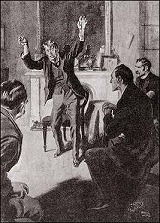“If they are not worth more than the last ones they are not of much use, ” said Amberley with a malevolent scowl. None the less, he kept me company. I had already warned Holmes by telegram of the hour of our arrival, but we found a message waiting that he was at Lewisham and would expect us there. That was a surprise, but an even greater one was to find that he was not alone in the sitting-room of our client. A stern-looking, impassive man sat beside him, a dark man with gray-tinted glasses and a large Masonic pin projecting from his tie.
“This is my friend Mr. Barker,” said Holmes. “He has been interesting himself also in your business, Mr. Josiah Amberley, though we have been working independently. But we both have the same question to ask you!”
Mr. Amberley sat down heavily. He sensed impending danger. I read it in his straining eyes and his twitching features.
“What is the question, Mr. Holmes?”
“Only this: What did you do with the bodies?”

The man sprang to his feet with a hoarse scream. He clawed into the air with his bony hands. His mouth was open, and for the instant he looked like some horrible bird of prey. In a flash we got a glimpse of the real Josiah Amberley, a misshapen demon with a soul as distorted as his body. As he fell back into his chair he clapped his hand to his lips as if to stifle a cough. Holmes sprang at his throat like a tiger and twisted his face towards the ground. A white pellet fell from between his gasping lips.
“No short cuts, Josiah Amberley. Things must be done decently and in order. What about it, Barker?”
“I have a cab at the door,” said our taciturn companion.
“It is only a few hundred yards to the station. We will go together. You can stay here, Watson. I shall be back within half an hour.”
The old colourman had the strength of a lion in that great trunk of his, but he was helpless in the hands of the two experienced man-handlers. Wriggling and twisting he was dragged to the waiting cab, and I was left to my solitary vigil in the ill-omened house. In less time than he had named, however, Holmes was back, in company with a smart young police inspector.
“I’ve left Barker to look after the formalities,” said Holmes. “You had not met Barker, Watson. He is my hated rival upon the Surrey shore. When you said a tall dark man it was not difficult for me to complete the picture. He has several good cases to his credit, has he not, Inspector?”
“He has certainly interfered several times,” the inspector answered with reserve.
“His methods are irregular, no doubt, like my own. The irregulars are useful sometimes, you know. You, for example, with your compulsory warning about whatever he said being used against him, could never have bluffed this rascal into what is virtually a confession.”
“Perhaps not. But we get there all the same, Mr. Holmes. Don’t imagine that we had not formed our own views of this case, and that we would not have laid our hands on our man. You will excuse us for feeling sore when you jump in with methods which we cannot use, and so rob us of the credit.”
“There shall be no such robbery, MacKinnon. I assure you that I efface myself from now onward, and as to Barker, he has done nothing save what I told him.”
The inspector seemed considerably relieved.
“That is very handsome of you, Mr. Holmes. Praise or blame can matter little to you, but it is very different to us when the newspapers begin to ask questions.”
“Quite so. But they are pretty sure to ask questions anyhow, so it would be as well to have answers. What will you say, for example, when the intelligent and enterprising reporter asks you what the exact points were which aroused your suspicion, and finally gave you a certain conviction as to the real facts?”